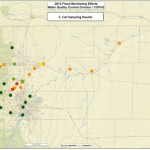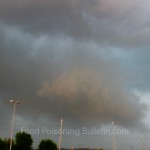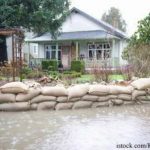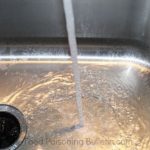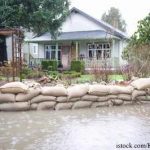The USDA has issued food safety recommendations for citizen affected by a massive storm system that caused severe flooding in the Florida Panhandle and the Alabama Coast. More than 10 inches of rain was dropped by that weather system. Pensacola saw between 15 and 20 inches of rain in 24 hours as of Wednesday, April 30, 0214. The flooding is the worst that area has seen in 30 years. As many as 30,000 residents are without power. More rain and wind are expected, and flash flooding is going to be a reality across most of the eastern U.S. from southern New England to the Gulf Coast. Food that has been in a flood needs to be inspected carefully. Unless the food is canned or sealed commercially and the container can be washed in a bleach solution or boiled, it must be discarded. Any food … [Read more...]
USDA’s Food Safety Tips For Severe Weather
The U.S. Department of Agriculture (USDA) has compiled some food safety tips for residents in the South and Midwest affected by severe weather. Here's what you need to know about food safety when sever weather is in the forecast. Before the storm strikes, make sure you have working appliance thermometers in both the refrigerator and the freezer. Safe temperatures for the fridge are 40°F or lower, in the freezer 0°F or lower. Freeze water in one-quart plastic storage bags or other small containers prior to a storm. Tuck them in between frozen foods to help keep them cold. Freeze any food you don't plan to eat in the immediate future such as leftovers, milk, fresh or poultry. This will help to keep them at a safe temperature for a longer period of time. Group food together in the freezer … [Read more...]
Report on Colorado Flooding and Water Safety
The Colorado Department of Public Health and Environment has released more information about water safety and quality after severe flooding last month. Sampling shows no evidence of pollutants from oil and gas spills in rivers and streams affected by the flooding. The department collected samples at 29 sites in eight different rivers. They showed high levels of E. coli in some areas of the South Platte Basin. The highest concentrations were found in Boulder Creek and Big Thompson River watersheds. The presence of E. coli indicates that human and animal bacteria from untreated sewage is in the water in those areas. Thankfully, outbreaks of communicable diseases or E. coli illnesses have not been reported. Five public drinking water systems are still on no boil and/or bottled water … [Read more...]
E. coli Found in Lyons CO Drinking Water
After the massive flooding in Colorado, the state and several cities and municipalities warned residents to avoid flood water and issued boil orders. Now E. coli bacteria has been found in the water system in Lyons, Colorado. The town is in the foothills north of Boulder. The news was streamed over the internet on the Longmont Channel because City Hall is shut down. City administrator Victoria Simonsen said in that meeting, "we don't want you using any of the water, so it was turned off. It is critical we get that back up and get it disinfected before we would want any of you to be back." Officials said it could take up to six months before the town is livable. Lyons was previously under a "boil water" order. The contamination is most likely from raw sewage and livestock waste. For … [Read more...]
USDA’s Food Safety Tips For Flood Victims
The U.S. Department of Agriculture’s (USDA) Food Safety and Inspection Service (FSIS) has compiled some food safety tips for flood victims in Nebraska. Here is what the agency recommends: Before the storm, store food on shelves that will be out of the path of floodwaters. But appliance thermometers. In the freezer, gather food together, to help it stay cold longer. If you lose power, a refrigerator will keep food cold for about 4 hours if you keep the door closed. A full freezer will keep food at a safe temperature for about 48 hours, a half-full freezer will keep food at a safe temperature for 24 hours. Keep the door closed as much as possible. Before you eat food from a powerless fridge or freezer, check the temperature, if the thermometer reads 40° F or below, the food is … [Read more...]
Flood Advisory Updates from Colorado
The Colorado Department of Public Health and Environment has posted updates about the serious flooding and water safety. They are advising people to avoid potentially contaminated flood waters, since contaminants such as raw sewage and chemicals from homes, businesses, and industry may be in the water. If you come into contact with floodwaters, wash frequently with warm water and soap. Several communities have issued "boil water advisories", including Firestone, Frederick, Left Hand Water District, Lyons, and Mountain Meadow (Allenspark). Widespread outbreaks of infectious diseases after floods aren't common in this country, but they can happen. If you have been ill with three or more days of diarrhea, any bloody diarrhea, diarrhea plus a fever, or other health concerns, contact your … [Read more...]
Flooding in Colorado Creates Water Safety Problems
The Colorado Department of Public Health and Environment has issued a health advisory and is advising residents to avoid contact with rivers and streams after massive flooding followed heavy rains this week. Rivers and streams may be contaminated with partially treated sewage and other wastewater because of power failures and damage to wastewater treatment systems. Keep out of rivers and streams in northeastern Colorado under further notice. The affected counties include Adams, Boulder, Broomfield, Larimer, Morgan, Logan, Sedgwick and Weld. Don't let children or pets play in the water, or to play with toys that have been in contact with the water. Wash hands frequently with soap and clean warm water. If you have been in contact with the water and experience diarrhea or vomiting, see … [Read more...]
Flood Safety Week: Food Safety During A Flood
It’s flood safety week and the U.S. Food and Drug Administration (FDA) has compiled some information including food safety tips during a flood. Doing a small amount of preparation can save a lot of time and hassle. Pay attention to weather forecasts when a lot of rain is predicted. Officials will often issue flood watches before the weather becomes really severe. Prepare for a flood by buying jugs of water and shelf-stable foods that can feed your family for a few days and store them in an area flood waters are not likely to reach. Keep a jug of liquid bleach and a cooler in the same area. Find out where you can purchase dry ice. If your home floods, use bottled water that has not been exposed to flood waters. If you run out of bottled water, boil tap water for one minute, let it … [Read more...]
Food Safety After A Flood
When in doubt, throw it out is a good rule of thumb for any situation where food safety is in question. That's one of the tips the U.S. Department of Agriculture's Food Safety and Inspection Service (USDA’s FSIS) has included on its recommendations to residents of flood-ravaged southeastern Texas. Historic levels of rain have swamped Houston and surrounding areas and power has been knocked out in some neighborhoods. While Harris County tries to assess the extent of flood damage, USDA officials are hoping to minimize illnesses that are sometimes associated with weather emergencies. "Refrigerated and frozen foods may reach unsafe storage temperatures when homes lose electricity, and food is also unsafe to eat if it has come into contact with flood waters," USDA Under Secretary for Food … [Read more...]

